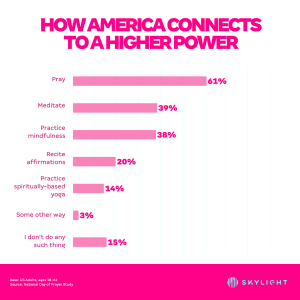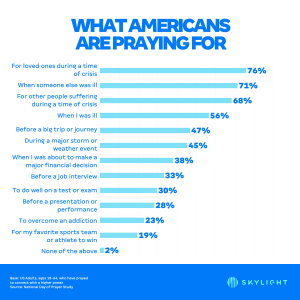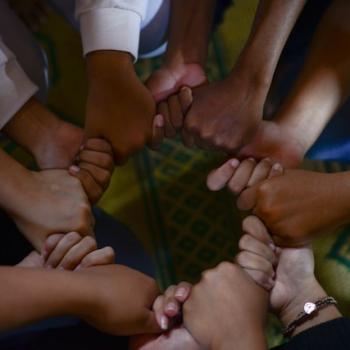Throughout history, humans have engaged in the universal practice of prayer. It is a form of communication with a higher power that transcends cultural, religious, and geographical boundaries. In recent years, there has been a growing interest in understanding the role of prayer in people’s lives and its impact on mental, physical, and spiritual well-being. To address this, a comprehensive survey commissioned by Skylight was conducted by City Square Associates. By gathering data from a diverse sample of individuals across the age groups 18-64. This survey aimed to explore people’s attitude towards prayer, their motivations for praying, and the impact it has on their lives. The results of the survey provide valuable insights into the role of prayer in contemporary society and shed light on the various ways in which people seek to connect with a higher power.
Prayer is a fundamental element in many religions and plays a crucial role in connecting the individual with the divine. In different religions, prayer may take on different forms, but it is usually a means of expressing devotion, seeking guidance, expressing gratitude, or asking for forgiveness. In Christianity, prayer is seen as a way of communicating with God and seeking his intervention. In Judaism, prayer serves as a means of praising God and asking for forgiveness for one’s sins. Hinduism has a rich tradition of prayer, where the devotee seeks to attain a deeper understanding of the divine through devotion. Buddhism also has a strong emphasis on prayer, with the practice being used as a means of cultivating mindfulness and inner peace. Similarly, in Islam, prayer is a vital aspect of worship, and it is seen as a means of attaining spiritual purity and seeking blessings from Allah.
Let’s get into the islamic perspective about prayers as well as taking insights from the survey.
On a daily basis muslims perform three forms of prayers.
- Salah
- Dhikr
- Dua
Salah
Salah in Arabic, is an essential pillar of Islam that serves as a way of connecting with Allah, the Almighty. It is a mandatory act of worship that Muslims perform five times a day at different times from morning till night fall, regardless of their geographical location, age, or social status. It is considered to be a direct communication channel between a Muslim and their Creator, and it is an act of submission, gratitude, and humility. It holds a significant position in the Islamic faith, and Muslims worldwide consider it as a means of attaining spiritual purity and seeking blessings from Allah.

Performing Salah, the Islamic prayer, requires adherence to certain rules and regulations. Before commencing the prayer, a Muslim must ensure that they are in a state of purity, which is achieved by performing Wudu, a cleansing ritual involving the washing of specific body parts. Additionally, one must dress in appropriate attire, ensuring that their body is covered in a modest manner. Salah can be performed in any clean place, but the individual must ensure that they are facing the Qibla, which is the direction of the Kaaba in Mecca. Once the prerequisites are met, the individual begins the prayer by reciting passages from the Quran and engaging in physical movements, such as bowing and prostrating, that symbolize their submission and devotion to Allah. This form of prayer can be performed individually and in congregation.
“And seek help through patience and prayer, and indeed, it is difficult except for the humbly submissive [to Allah]“ [Qur’an: Chapter 2, Verse 45].
Benefits of Salah
Apart from spiritual benefits of connecting with Allah(SWT), attaining rewards and forgiveness of sins, there are many physical and social benefits of salah.
- Muslims take great care to maintain cleanliness and purity in their daily lives, and one of the ways they do this is through wudu. By washing their hands and legs before each prayer, a Muslim is able to cleanse both their body and their spirit, preparing themselves for the act of worship.
- But wudu is only the beginning of the spiritual journey that takes place during prayer. When Muslims face towards the kaaba and perform salah, they join with millions of others around the world who are also engaged in this same act of worship. This shared experience helps to create a sense of unity and belonging within the ummah, or Muslim community.
- During salah, Muslims engage in a series of physical movements and recitations that are designed to focus the mind and soul on Allah. By repeating the words of the Qur’an and performing specific postures, Muslims are able to enter into a state of deep meditation, which can have a powerful calming effect on the mind and body. This can be especially helpful for those who struggle with anxiety or depression, as it provides a way to center oneself and find inner peace.
Dhikr
Dhikr, or the remembrance of Allah (SWT), is a fundamental aspect of Islamic spirituality that involves the repetition of certain phrases, names, or verses from the Qur’an in order to maintain a close connection with Allah. Dhikr is not just an act of worship, but a way of life that permeates every moment of a Muslim’s day, as it helps to cultivate a constant awareness of Allah’s presence and guidance. It is a powerful tool for spiritual development and personal transformation.
Dhikr is not limited to a specific time or place, but can be done at any moment, whenever possible. For instance, after a meal, a Muslim may say “Alhamdulillah” as a way of expressing gratitude to Allah for providing sustenance. Similarly, when we witness something beautiful in nature or in our surroundings, we may say “Subhanallah” to acknowledge the majesty and wonder of Allah’s creation. At leisure times, Muslims may engage in more extended sessions of dhikr by reciting certain phrases and keeping count on fingers or beads. This practice helps to keep one’s heart and mind focused on Allah and serves as a powerful reminder of His presence in our daily lives.
“Such are the ones who believe (in the message of the Prophet) and whose hearts find rest in the remembrance of Allah. Surely in Allah’s remembrance do hearts find rest. “ (13:28) Quran
Dua (Supplications)
Dua, or supplication, is a central practice in Islamic worship that involves addressing Allah (SWT) with humility and seeking his guidance, blessings, and forgiveness. It is an opportunity to express one’s innermost thoughts, feelings, and desires, whether they be worries, regrets, or wishes, to the Creator who has the power to grant them. Through dua, Muslims can deepen their connection with Allah and express their innermost thoughts and emotions in a direct and intimate way. It is a powerful tool for spiritual growth and personal transformation, and has been an integral part of Islamic worship since the time of the Prophet Muhammad (peace be upon him).
 In fact, making dua is so beloved by Allah that it has been described as the “essence of worship” and the “weapon of the believer.” Through the power of dua, Muslims can find solace, strength, and inspiration in even the most difficult of circumstances, knowing that they have a direct line of communication with their Lord.
In fact, making dua is so beloved by Allah that it has been described as the “essence of worship” and the “weapon of the believer.” Through the power of dua, Muslims can find solace, strength, and inspiration in even the most difficult of circumstances, knowing that they have a direct line of communication with their Lord.
Benefit Of Any Form Of Religious Prayers
Engaging in any form of prayers has multiple benefits which is proved by a research done by Andrew Newberg. He has conducted scans of brain activities of people in rest and praying. He has found that engaging in regular daily prayers can have a significant impact on the structure and function of the brain. Specifically, it has been found that prayer can help to halt the shrinking of the frontal lobe, which is responsible for regulating important cognitive functions like speaking, reading, and memory. This can help to prevent memory loss and cognitive decline in old age.
Additionally, prayer has been found to increase activity in the anterior cingulate, which is the area of the brain responsible for regulating our social connectivity and contributing to overall happiness and well-being. By deactivating the parietal lobe and limbic system, which are responsible for feelings of isolation and negative emotions, prayer can create a more positive and fulfilling life experience. With these benefits, it is no wonder that prayer has been such an integral part of the religious rituals for centuries. These findings will inspire more people to engage in regular prayer and reap the incredible rewards that it offers.
To uncover more methods and motivations in connection with the divine, sign-up for 2023 american prayer wrap on skylight.
















